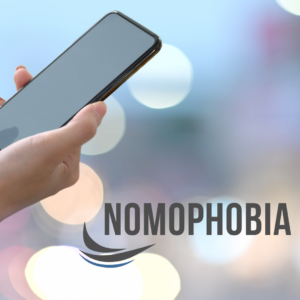When Phone Separation Anxiety Takes Hold
 In today’s digital age, our smartphones have become an integral part of our daily lives. However, for some, this dependency on mobile devices can evolve into a condition known as nomophobia—short for “no mobile phobia.”
In today’s digital age, our smartphones have become an integral part of our daily lives. However, for some, this dependency on mobile devices can evolve into a condition known as nomophobia—short for “no mobile phobia.”
- Understanding Nomophobia
Nomophobia is a relatively new term that describes the fear or anxiety people experience when they are without their smartphones or unable to use them. The term is a blend of “no mobile” and “phobia,” signifying the irrational fear of being without a mobile device. While not an officially recognized medical disorder, it is a prevalent and growing concern in the digital age.
Symptoms of nomophobia may include restlessness, increased heart rate, anxiety, and a constant need to check one’s phone. Individuals with nomophobia often experience discomfort when their phone battery is low, or when they have no access to mobile networks or Wi-Fi.
- The Impact on Mental Health
Nomophobia can have a significant impact on mental health. Excessive smartphone use and the fear of being without one’s phone can lead to stress, anxiety, and other negative emotions. Here are some ways in which nomophobia can affect mental health:
- Increased Anxiety: The constant need to check one’s phone or the fear of missing out on important notifications can heighten anxiety levels. The fear of being disconnected from the digital world can be overwhelming.
- Impaired Sleep: Overuse of smartphones, especially before bedtime, can disrupt sleep patterns. The blue light emitted by screens can interfere with the production of melatonin, a hormone that regulates sleep.
- Social Isolation: Paradoxically, excessive smartphone use can lead to social isolation. Instead of engaging with people in the real world, individuals may prefer to communicate through text messages and social media, leading to a lack of meaningful face-to-face interactions.
- Reduced Productivity: Constant smartphone checking can result in reduced productivity as individuals become distracted and find it difficult to concentrate on tasks. This can lead to stress and decreased job performance.
- Negative Self-esteem: Social media can be a platform for comparison and unrealistic self-image standards, which can negatively impact self-esteem. Constantly comparing oneself to others can lead to feelings of inadequacy and anxiety.
- Coping Strategies for Nomophobia
If you suspect that you or someone you know is experiencing nomophobia, there are several strategies to help manage this condition and reduce its impact on mental health:
- Digital Detox: Taking regular breaks from your smartphone can help reduce the fear of being without it. Designate specific times to disconnect from your device, such as during meals or before bedtime.
- Limit Screen Time: Set boundaries on the amount of time you spend on your smartphone each day. You can use screen time tracking features on your device to monitor and limit usage.
- Practice Mindfulness: Engaging in mindfulness exercises can help reduce anxiety and promote a healthier relationship with your smartphone. Techniques like deep breathing and meditation can be effective in managing nomophobia.
- Prioritize Real-world Connections: Make an effort to spend time with friends and family in person. Strengthening real-world connections can reduce the reliance on virtual interactions.
- Seek Professional Help: If nomophobia is significantly impacting your mental health, it may be beneficial to seek the guidance of a mental health professional. They can help you develop coping strategies and provide support to manage the condition.
- Disable Non-essential Notifications: Turn off notifications for apps that are not essential. This can reduce the constant urge to check your phone for updates.
- Create Phone-free Zones: Designate areas where smartphone use is not allowed, such as the dining table or the bedroom. This can help create a healthier balance between technology and real life.
- Engage in Hobbies and Activities: Find interests and hobbies that do not involve smartphones. Engaging in physical activities, reading, or pursuing creative endeavors can divert your attention from your device.
- Educate Yourself: Understanding the addictive nature of smartphones and the impact of excessive screen time can help you make more informed choices about your phone use.
Nomophobia, or the fear of being without a mobile device, is a growing concern in our technology-driven world. It can have a significant impact on mental health, leading to increased anxiety, impaired sleep, and reduced productivity. Recognizing the symptoms and implementing coping strategies, such as digital detox, setting screen time limits, and prioritizing real-world connections, can help manage and reduce the negative effects of nomophobia.



























